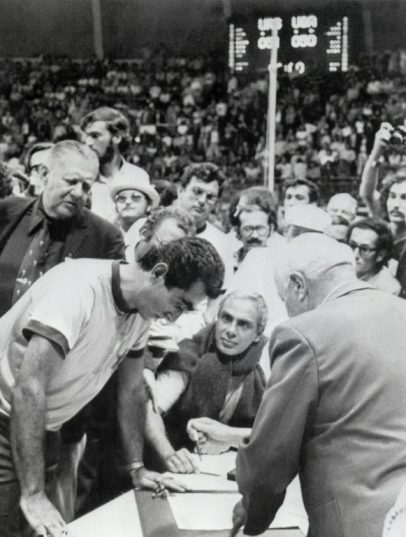“Going Vertical” shows Soviet players claiming victory over the US in the final of the 1972 Munich Games, but skirts around the fact that the Americans never accepted defeat because of claims of incorrect refereeing.
At a packed viewing in Moscow last week, Russians teared up and broke into applause as photos of the USSR team were shown over the credits.
Current scandals may have boosted the film’s success, director Anton Megerdichev told AFP, but he said the “energy of that match could not leave anyone indifferent”.
The Americans were leading by one point with three seconds left when Soviet Ivan Edeshko heaved a pass across the entire court and his teammate Alexander Belov scored the winning basket as two US defenders fell over.
Edeshko, one of four surviving Soviet team members, told AFP that the final-seconds, one-point victory was nothing short of divine intervention.
“It’s hard to win in three seconds without help, and that help came from God,” said Edeshko, now 72.
He recalled official expectations that his team could not beat the US, which had never lost at the Olympic Games.
“A second place was planned for us, and when the Soviet Union, a planned economy, plans, you can’t leap higher than that,” he joked.
The movie has netted 1.82 billion rubles ($32.4 million, 26.3 million euros) since its December release, making it the country’s highest-grossing film ever.
– Soviet nostalgia –

A referee tries to explain what happened in the controversial final seconds of the US-Soviet basketball final in the 1972 Olympics
The Soviet players are portrayed as underdogs against their basketball-obsessed Cold War rivals and the film was made by the Trite studio of Oscar-winner Nikita Mikhalkov, known for his nationalist views.
However Megerdichev stressed the film has “absolutely no anti-Americanism”.
“We’re proud that we show two points of view and the viewer empathises with Americans no less than with Soviet players,” he said.
In line with a recent trend in local films, “Going Vertical” elicits Soviet nostalgia, with the multi-ethnic USSR squad symbolising harmony between Russia and the other republics in the union.
But it also shows Soviet players receiving salaries and medical care far inferior to Western standards and resorting to smuggling contraband goods for extra cash.
In one scene players bring tins of beluga caviar to America to sell, while their luggage on the way back from another foreign trip is stuffed with ordinary consumer goods like knitting yarn.
The widows of coach Vladimir Kondrashin and player Belov have sued the filmmakers over liberties taken in the script, but director Megerdichev said the work should not be judged as a documentary.
– Unclaimed medals –
US basketballers mistakenly celebrate what they thought was victory over the Soviet Union in the 1972 Olympics, before the USSR won by one point
The film ends on a high note and doesn’t delve into the fact that the US team refused their silver medals and even decades later do not admit defeat.
“We thought that the refereeing was improper and to this day our medals are sitting in Switzerland,” said Tom McMillen, a former member of the US squad.
Megerdichev said he shot alternative endings, one of which showed the empty pedestal for second place, but settled on a tighter finale.
McMillen said the 1972 final led to changes in the sport, encouraging the National Basketball Association to recruit internationally. A rule barring professional NBA athletes from the Olympics was also eventually dropped.
He said a symbolic rapprochement with Russia over the match was considered some years ago and the US team even planned to meet President Vladimir Putin, but it fell apart, “I guess from some geopolitical issues”.
McMillen had pitched the idea for the US team to accept dual gold medals, which would then be given to charity, but teammates “feel strongly that they have won the game” and refused, he said.
“It’s one of those controversies that will go on and on.”
Download our app and read this and other great stories on the move. Available for Android and iOS.